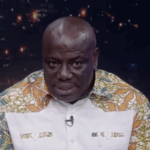
Ranking Member on Parliament’s Communications Committee, Matthew Nyndam, says nothing in Ghana should gag anyone from speaking, insisting that freedom of expression remains a fundamental right that must be protected at all times.
The Kpandai MP, speaking on JoyNews’ PM Express on November 3, said that while the government may know ongoing procedural discussions on media regulation, it would be wrong for anyone to interpret such actions as attempts to silence dissent or restrict speech.
“I think that with the procedural issues, I’m very sure that obviously government will have some knowledge about this, maybe talking about the finality.
“I may be tempted to agree with him, but obviously, the Communication Minister Sam George will not just come and throw this out there without having the president in mind, without having the followers, especially when it comes to cabinet… cabinet is everything.
“So I will be surprised that at least he just comes out and then he puts it out there just like that,” he said.
The Kpandai MP stressed that no person or authority should suppress free speech in any form.
“Nothing in Ghana should gag anybody from speaking, absolutely nothing,” he declared, adding that “we must all know that we are human. So it’s not all the time that whatever you say, you get right — you will err.”
He noted that Ghana already has sufficient laws that allow for accountability and correction when someone crosses the line.
His comments followed concerns raised on the same show by Jibriel Suliah Jagbesie, General Secretary of the New Media Association of Ghana, who said that while his members support regulation, they fear excessive policing and vague accountability clauses in the draft framework.
“We are happy we are going to be regulated. We don’t have a problem with that. But what we are scared of is the policing side of it. We are also scared about the accountability side of it,” Jagbesie said, explaining that some aspects of the proposed regulatory draft lacked clarity.
He said his members — made up of bloggers, photographers, content creators, and online journalists — want to be involved in shaping the new framework.
“The new draft that we are seeing is vague, and most of our members are complaining about it. They are not finding specific statements to back up some of these things, and we think it is vague.
“We should be involved as a body because we are the only association that has over 200 members across the country when it comes to new media,” he said.
Jagbesie added that his members fear the punitive provisions in the draft.
“We are scared of the punishment… in some cases, even the traditional media, they just get it a bit wrong sometimes. So if you get it a bit wrong, does that mean that you should be imprisoned for five years?” he asked.
Mr. Nyndam, however, maintained that even with regulation, freedom of expression must remain sacred, emphasising that Ghana’s democracy thrives only when citizens can speak freely — even when they make mistakes.